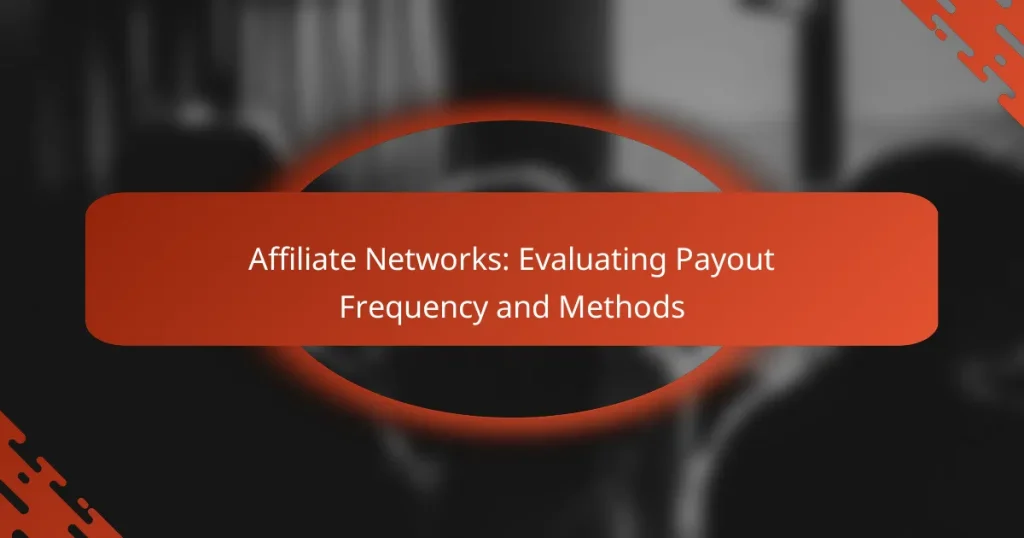When choosing an affiliate network, evaluating payout frequency and methods is crucial for ensuring timely earnings. Different networks offer various payment options, such as direct bank transfers and PayPal, each with unique benefits. Understanding the factors that influence payout schedules can help affiliates optimize their cash flow and make informed decisions about their partnerships.

What are the best affiliate networks for payout frequency in the US?
The best affiliate networks for payout frequency in the US offer timely payments, flexible methods, and reliable tracking. These networks cater to various niches and provide options that can suit different affiliate needs, ensuring that marketers receive their earnings promptly.
Amazon Associates
Amazon Associates is one of the largest and most popular affiliate programs, known for its reliable payout frequency. Affiliates can expect payments approximately every 60 days, provided they meet the minimum payout threshold of $10 for direct deposit or $100 for checks.
While the payout frequency is decent, affiliates should consider the commission rates, which typically range from 1% to 10% depending on the product category. This means that while you may earn regularly, the overall earnings can vary significantly based on the products promoted.
ShareASale
ShareASale offers a flexible payout schedule, allowing affiliates to receive payments on a monthly basis, typically around the 20th of each month. The minimum payout threshold is $50, which is achievable for many affiliates.
Affiliates can choose from various payment methods, including direct deposit, checks, and PayPal. This flexibility makes ShareASale an attractive option for those looking for consistent earnings without long waiting periods.
Rakuten Marketing
Rakuten Marketing provides a reliable payout frequency, with payments made on a monthly basis. The minimum payout threshold is set at $50, which is reasonable for most affiliates to reach within a month.
Affiliates can opt for various payment methods, including direct deposit and checks. However, it’s essential to note that commission rates can vary widely, so affiliates should evaluate the potential earnings based on their niche and promotional strategies.
ClickBank
ClickBank is known for its high commission rates and frequent payouts, typically occurring every week. Affiliates can receive payments through direct deposit or checks, with a minimum payout threshold of $10 for direct deposit and $100 for checks.
This rapid payout frequency is particularly appealing for affiliates promoting digital products, as it allows for quicker reinvestment into marketing efforts. However, affiliates should be mindful of the competitive nature of ClickBank’s marketplace.
FlexOffers
FlexOffers offers a monthly payout schedule, with payments usually processed around the 20th of each month. The minimum payout threshold is $50, making it accessible for many affiliates.
Affiliates can choose from various payment methods, including direct deposit and checks. It’s important to review the commission structures, as they can vary significantly across different advertisers within the network, impacting overall earnings potential.

How do payout methods differ among affiliate networks?
Payout methods among affiliate networks vary significantly, affecting how and when affiliates receive their earnings. Common methods include direct bank transfers, PayPal payments, check payments, and wire transfers, each with its own advantages and considerations.
Direct bank transfers
Direct bank transfers are a popular payout method that allows affiliates to receive their earnings directly into their bank accounts. This method is typically secure and can be processed quickly, often within a few business days.
However, affiliates should consider potential fees charged by their banks for incoming transfers, which can vary by country. Additionally, some networks may require a minimum payout threshold to initiate a transfer, usually ranging from $50 to $100.
PayPal payments
PayPal is widely used for affiliate payouts due to its convenience and speed. Affiliates can receive funds almost instantly, making it an attractive option for those who prefer quick access to their earnings.
It’s important to note that PayPal may charge transaction fees, which can affect the total amount received. Affiliates should also ensure their PayPal account is verified to avoid delays in receiving payments.
Check payments
Check payments are less common but still offered by some affiliate networks. This method involves sending a physical check to the affiliate’s mailing address, which can take longer to process, often up to several weeks.
Affiliates should be aware of the risks associated with check payments, such as the possibility of checks getting lost in the mail. Additionally, some networks impose a higher minimum payout threshold for check payments, sometimes exceeding $100.
Wire transfers
Wire transfers provide a secure way for affiliates to receive large sums of money directly into their bank accounts. This method is often preferred for international payments, as it can bypass some currency conversion issues.
However, wire transfers can incur higher fees, both from the sending network and the receiving bank, which affiliates should consider. A typical fee might range from $15 to $50, depending on the banks involved and the amount being transferred.

What factors influence payout frequency in affiliate marketing?
Payout frequency in affiliate marketing is influenced by several key factors, including network policies, minimum payout thresholds, payment schedules, and currency conversion times. Understanding these elements can help affiliates manage their cash flow and expectations effectively.
Network policies
Each affiliate network has its own set of policies that dictate payout frequency. Some networks may offer weekly payouts, while others might operate on a bi-weekly or monthly basis. Affiliates should review the network’s terms to understand how these policies affect their earnings.
It’s essential to consider the reputation of the network as well. Established networks often have more reliable payment processes, which can lead to more consistent payout schedules.
Minimum payout thresholds
Minimum payout thresholds are the minimum amount an affiliate must earn before they can receive a payment. These thresholds can vary significantly between networks, ranging from as low as $10 to over $100. Affiliates should choose networks with thresholds that align with their earning patterns to avoid delays in receiving funds.
Some networks may allow affiliates to request a payout before reaching the threshold, but this could incur additional fees or delays. Understanding these conditions is crucial for effective financial planning.
Payment schedules
Payment schedules determine how often affiliates receive their earnings. Common schedules include weekly, bi-weekly, and monthly payments. Affiliates should select networks that offer payment schedules that suit their cash flow needs.
Additionally, some networks may have different payment methods available, such as direct deposit, PayPal, or checks, which can also affect the timing of when funds are accessible.
Currency conversion times
If affiliates operate in different countries or work with international networks, currency conversion times can impact payout frequency. Converting earnings from one currency to another may take additional time, which can delay the overall payout process.
Affiliates should be aware of the conversion rates and fees associated with their chosen payment methods. Using a payment method that minimizes conversion times can help ensure quicker access to funds.

How to choose an affiliate network based on payout methods?
Choosing an affiliate network based on payout methods involves evaluating the types of payments offered, understanding transaction fees, and assessing the reliability of payouts. These factors can significantly impact your earnings and cash flow as an affiliate marketer.
Evaluate payment options
When selecting an affiliate network, first examine the available payment options. Common methods include bank transfers, PayPal, checks, and digital wallets. Each option has its own advantages; for instance, PayPal offers quick access to funds, while bank transfers may be more secure for larger amounts.
Consider your personal preferences and needs. If you frequently work with international partners, look for networks that support multiple currencies and payment methods to avoid conversion fees. A network that offers flexibility in payment options can enhance your overall experience.
Consider transaction fees
Transaction fees can eat into your earnings, so it’s essential to understand the costs associated with each payment method. Some networks may charge a flat fee per transaction, while others may take a percentage of your earnings. For example, PayPal typically charges around 2.9% plus a fixed fee based on the currency.
Compare the fee structures of different networks to determine which is most cost-effective for your expected earnings. Avoid networks with high fees unless they offer significant advantages in other areas, such as faster payouts or better support.
Assess payout reliability
Payout reliability is crucial for maintaining a steady income as an affiliate. Investigate the network’s payout schedule and ensure it aligns with your cash flow needs. Many networks offer monthly payouts, but some may provide bi-weekly or weekly options, which can be beneficial for affiliates who require quicker access to funds.
Read reviews and testimonials from other affiliates to gauge the network’s reputation for timely payments. A network that consistently meets its payout deadlines can help you plan your finances more effectively, reducing stress and uncertainty.

What are the common payout schedules in affiliate networks?
Affiliate networks typically offer various payout schedules, with weekly and monthly being the most common. Understanding these schedules helps affiliates manage their cash flow and plan their finances effectively.
Weekly payouts
Weekly payouts allow affiliates to receive their earnings every week, which can be beneficial for those who rely on consistent income. This schedule is often preferred by affiliates who generate high volumes of sales or traffic, as it provides quicker access to funds.
However, weekly payouts may come with higher minimum payout thresholds or additional fees. Affiliates should check the specific terms of their network to understand any conditions that apply, such as a minimum earnings amount or transaction fees that could affect their net income.
Monthly payouts
Monthly payouts are another common option, where affiliates receive their earnings once a month. This schedule is often easier for networks to manage, as it consolidates transactions and reduces administrative overhead.
While monthly payouts can mean longer waiting times for affiliates, they may also come with lower minimum payout thresholds and fewer fees. Affiliates should weigh the benefits of receiving larger sums less frequently against their cash flow needs when choosing a payout schedule.


